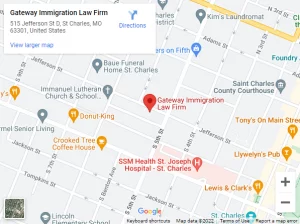Employment Immigration Attorney in St. Charles, Missouri
Are you considering getting an immigrant visa through employment, but you don’t know where to start? Worry no more, our experienced employment immigration lawyer has helped people just like you obtain a green card.
In employment-based immigration, you must have a permanent job offer (supported by a labor certification) waiting for you in the United States. However, there are circumstances in which you will not need any of this, such as possessing extraordinary abilities or investing. There are several ways to obtain a green card through employment, and they are as follows:
- Employment first preference (EB-1)
- Employment second preference (EB-2)
- Employment third preference (EB-3)
- Employment fourth preference (EB-4)
- Employment fifth preference (EB-5)
They appear to be intimidating, right? Don’t be! We at Gateway Immigration Law Firm can assist you every step of the way in obtaining your green card through employment-based immigration. Our employment Missouri immigration attorneys have offered our clients well-rounded and competent legal services over the years of expertise in immigration issues.
Why do I Need a Missouri Employment Immigration Attorney?

You have this vision that you want to work and live in the United States doing what you love. How about we tell you that, given the right conditions, we can assist you in making your idea a reality?
The Immigration process and law are complicated, and you need an immigration lawyer who knows the ins and outs of it. Our experienced immigration attorney is familiar with the many types and methods to get a green card and the qualifications that must be met.
Furthermore, their years of service made them experts in immigration issues (e.g., creating strong immigration appeals). At Gateway Immigration Law Firm, we believe that there are no minor or big cases; only your aspirations that we wish to make a reality.
Immigration has been based on family ties since the founding of our first colonies in the 17th century. Still, the Immigration and Nationality Act (INA) of 1965 explicitly established family ties as the significant method individuals use to move to America. Each year, family visas account for around 65 percent of legal immigration.
What is Employment-Based Immigration?
Essentially, a green card is accessible for workers or occupations covered under immigration laws. As a result, individuals would be able to work and will have permanent residency status in the United States indefinitely.
Continue reading to learn more about the many ways to receive a green card.
Types of Employment-based Immigration
1. Employment First Preference (EB-1) Category
Among the other categories, the EB-1 is one of the more straightforward applications for a visa since employers do not need to seek labor certification on your behalf. With this, self-petition is possible, and a job offer is not a prerequisite under certain circumstances.
The first preference category (sometimes called “priority” workers) is further divided into three subcategories, namely:
- workers of extraordinary ability
- outstanding university professors or researchers, and
- transferring executives or managers of multinational companies.
a. Workers of Extraordinary Ability Subcategory (EB-1a)
Under this subcategory, a foreign national who shows extraordinary abilities in the sciences, arts, education, business, or athletics will be given an opportunity to apply for a green card.
To qualify, one needs to consider the following:
- achievements must have been publicly recognized,
- and resulted in a period of sustained national or international acclaim.
It is important to remember that under the Extraordinary Ability Subcategory, you do not need a job offer to qualify, and you can self-petition. However, keep in mind that you will be required to continue working in your field of expertise in the United States. Overall, as long as you are widely recognized in your specific area of expertise, your future in America awaits you.
b. Outstanding Professors and Researchers Subcategory (EB-1b)
Individuals with a worldwide reputation for excellence and a minimum of three years of either teaching or research experience in a certain academic field will be eligible for a green card as a priority worker.
In this subcategory, you will require a job offer. Your job offer should be for a teaching or research post in a university or other institution of higher learning. In research positions, it is important to note that the position is not a temporary one and that your employer’s university or organization has a track record of substantial research accomplishments.
c. Multinational Executives and Managers Subcategory (EB-1c)
Are you employed as an executive or manager of a multinational firm outside the United States for at least one of the last three years, or are you now working in the United States on a temporary or nonimmigrant visa for one of the three years prior to your arrival? If this is the case, you are one step closer to becoming an American citizen.
Those who qualify under this subcategory can get a green card, but they must have a job offer, and the company must file a petition on their behalf.
2. Preference (EB-2) Category
This second type of employment-based immigration is dedicated to persons who:
- hold advanced university degrees, and
- have exceptional ability in the sciences, arts, or business.
It must be noted that in order to qualify for this category, you must have definite and permanent work in your specialized profession provided to you in the United States. This means that a labor certification will be required from you.
a. Advanced Degree Professionals Subcategory (EB-2a)
A professional with an advanced degree (for example, a graduate-level degree or a professional degree requiring postgraduate education) is eligible for a green visa.
But what if all you have is a baccalaureate degree? Are you still qualified? Under certain circumstances, the answer is yes. You may be eligible if you have a baccalaureate degree and five years of professional job experience.
It should be highlighted that a professional who possesses a temporary or nonimmigrant visa, such as nurses or engineers, will not be eligible for this category until they have earned postgraduate degrees.
b. Persons of Exceptional Ability Subcategory (EB-2b)
This subcategory is less strict than the EB-1 workers of extraordinary ability subcategory since you do not need to demonstrate international acclaim in your field. However, you must demonstrate that you are much more accomplished than the average individual in your field.
Furthermore, this is exclusively for persons who have a background in the sciences, arts, or business. Thus, economists, attorneys, physicians, veterinarians, physicists, market research analysts, geographers, mental health specialists, and marital and family therapists are among the most prevalent professionals who apply for this petition.
It should be noted that a job offer or Labor Certification is required for this subcategory, however, it can be waived if you qualify for national interest waivers (NIV).
National interest waivers essentially imply that a person can seek to waive the necessity of a job offer or Labor certification because he or she can contribute to the national interest of the United States.
3. Employment Third Preference (EB-3) Category
You may be eligible for a green card if you are a professional worker, skilled worker, or unskilled worker. You must have a full-time employment offer and a labor certification to be eligible for this category. A national interest waiver (NIV) is not applicable for this category.
a. Professional Workers (Bachelor's Degree) Subcategory (EB-3a)
Professional individuals who hold at least a bachelor’s degree (B.A. or B.S.) or equivalent from a college or university are regarded in this classification.
In contrast to the Advanced Degree Professionals Subcategory, if you have less than five years of job experience, you may still be eligible for a green card.
b. Skilled Workers Subcategory (EB-3b)
Skilled workers are defined as having at least two years of training or experience in a certain occupation. Also, other relevant post-secondary education may be considered as training. Hence, this means that a college degree is not a requisite.
c. Unskilled Workers Subcategory (EB-3c)
This category includes jobs or workers that are not specified in the preceding two subcategories. Generally, such occupations need fewer than two years of training or experience. Workers or occupations considered under this category are janitors, nurse’s aides, housekeepers, and so on.
4. Employment Fourth Preference (EB-4) Category
Special immigrants, such as clergy and religious professionals, broadcasters, Afghan or Iraqi translators or interpreters, and so on, fall under this category of employment-based immigration (to know more about who are qualified under this category, USCIS website).
A written affidavit of support from the sponsor confirming that they would be financially responsible for the application(s) is also required. Subsequently, each potential immigrant is subjected to a thorough background and security investigation, including criminal, national security, health-related, and other tests. USCIS also examines all green card applications to ensure that the immigrant will not become a public charge who will require public support.
After USCIS approves the petition, it is sent to the National Visa Center (NVC), which instructs the applicant to fill out specific forms, provide the required documents, and pay the costs. After the NVC receives all needed documentation, the applicant is interviewed by a U.S. Embassy or Consulate officer to assess their eligibility. Before the government grants the visa, all candidates must undergo a medical examination by an approved physician and get specific immunizations.
5. Employment Fifth Preference (EB-5) Category
An investor and their family can receive a green card under this category. Basically, they must be willing to invest at least $900,000 to $1,800,000 in a new U.S. business. The investor must also ensure that the investment will produce at least 10 full-time employment in the United States.
- Proof that the sponsor is a U.S. citizen or green card holder
- Proof that a legally valid relationship exists
- Proof that the relationship is not fraudulent
- Proof of name changes for the sponsor or the person seeking a green card
- Proof of nationality of the person seeking a green card
Make Your Vision Come Into Reality by Contacting our Employment Immigration Attorney Today!
As a law office, we have always taken pride in our quality legal advice and assistance to our clients who have immigration concerns. We have years of experience in appealing immigration cases in an immigration court. We have well-rounded immigration lawyers who cater to various types of immigration matters, such as family immigration. They have dedicated themselves to immigration practice and studying Immigration law which makes them strong advocates for our clients.
Contact us right now and let us begin working together to make your dreams come true.



